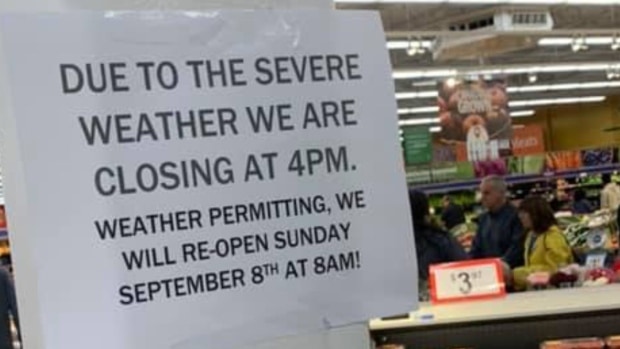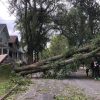
KJIPUKTUK (Halifax) – Because of Hurricane Dorian most shops, bars and stores were closed from at least last Saturday at noon until the following Tuesday. Depending on whether or not there was electricity or damage, many shops and services did not re-open till later Tuesday or even Wednesday.
Does anyone pay workers when they can’t work due to “weather”? Hourly paid workers – such as bar, restaurant, and coffee shop employees simply do not get paid. This week, they could lose nearly half their week’s pay (and tips), due to the closures. Some more conscientious employers do try to compensate their employees, but those employers are few and far between.
Just as the public got stuck with having to throw away often hundreds of dollars worth of milk, vegetables, eggs and frozen food in their own fridges and freezers which went bad or thawed because of a lack of electricity, so too did restaurants, coffee shops and grocery stores. No doubt employers or owners who grouse about their business food losses are not thinking much about their employees who are now going without pay.
About 73% of workers in Nova Scotia are covered by the meager protections and benefits set set out in Nova Scotia Labour Standards. I scoured the Labour Standards Code only to confirm that employers have no obligation to pay their staff – when the premises are closed due to “weather”, lack of power, or flooding. Essentially, if workers don’t work, they do not get paid.
The other 27% of NS workers are union members, so they benefit from better working conditions and wages which are negotiated by their unions. Some, especially those on salary, they will get paid, even when weather made it impossible to go to work.
Statistics Canada reveals that across Canada and in Nova Scotia the most common occupation for women is retail salesperson. But most of them work part time, don’t earn as much or get promoted as often as men who work in retail. With the malls and shops closed in the wake of the hurricane, women especially lost hours and income. The most common job for men is truck driving. While drivers lost routes and days because of the storm, overall men are paid more, and typically rely on full time jobs.
The clean-up of Hurricane Dorian adds to GDP (Gross Domestic Product). As long as money is spent fixing shingles, drying basements, chopping up downed trees and taking down a construction crane – it adds to the economy. However for all those retail workers, cashiers, servers and bartenders – Hurricane Dorian proved to be a financial disaster.
Judy Haiven is a retired Management professor at Saint Mary’s University. She’s now on the steering committee of Equity Watch – contact her at equitywatchns@gmail.com.
With a special thanks to our generous donors who make publication of the Nova Scotia Advocate possible.
Subscribe to the Nova Scotia Advocate weekly digest and never miss an article again. It’s free!



